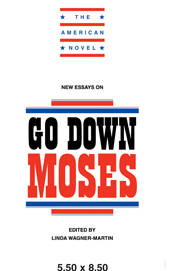
-
Select format
-
- Publisher:
- Cambridge University Press
- Publication date:
- 16 January 2010
- 13 June 1996
- ISBN:
- 9780511624568
- 9780521454315
- 9780521456098
- Dimensions:
- (228 x 152 mm)
- Weight & Pages:
- 0.325kg, 172 Pages
- Dimensions:
- (228 x 152 mm)
- Weight & Pages:
- 0.214kg, 172 Pages
- Subjects:
- Literature, Area Studies, American Literature, American Studies
- Series:
- The American Novel
You may already have access via personal or institutional login- Subjects:
- Literature, Area Studies, American Literature, American Studies
- Series:
- The American Novel
Book description
Go Down, Moses (1942) came to fruition during the Second World War, was written during one of Faulkner's most traumatic periods, and has fallen to critical neglect amid the vast scholarship on the great Southern writer. In part, this collection aims to tilt the balance, forcing the reader beyond critical commonplaces through asking challenging questions. The five essays assembled here explore the tensions of race and gender apparent throughout the novel. Judith Sensibar approaches the work through Faulkner's relationship with Caroline Barr, the black woman who was his primary caretaker in life; Judith Wittenberg offers an ecological reading; John T. Matthews redefines the novel as a 'Southern' experience; Minrose Gwin focuses on the spaces in the text occupied by black women characters; and Thadious M. Davis charts further complications of the black-white relationships that lie at the heart of the novel.
Contents
Metrics
Full text views
Full text views help Loading metrics...
Loading metrics...
* Views captured on Cambridge Core between #date#. This data will be updated every 24 hours.
Usage data cannot currently be displayed.
Accessibility standard: Unknown
Why this information is here
This section outlines the accessibility features of this content - including support for screen readers, full keyboard navigation and high-contrast display options. This may not be relevant for you.
Accessibility Information
Accessibility compliance for the PDF of this book is currently unknown and may be updated in the future.


